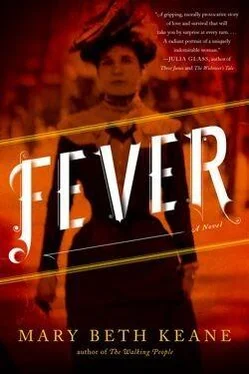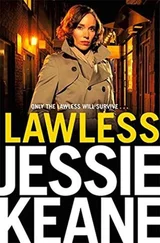• • •
Ten o’clock in the morning was not Alfred’s best hour. She thought of his long, white legs, splayed out on the starker white of their bedsheets. She thought of him standing by the window in his shorts. She thought of all the eggshells and orange peels that had probably collected in the sink for twenty-seven months, all the bottles that would need scouring. She thought of him in work clothes, making his way up the building’s stairs to their flat on the sixth floor. Who talked to him in the course of a day? Where did he take his meals? She thought of him running his hand along the curve of her back to her backside and pulling her toward him.
She missed seeing human beings other than herself and John Cane, who had a strange fascination with watching her eat what he brought for her from the hospital kitchen. The night before the hearing, when he should have been worrying about getting her that iron in time, he’d brought her two slices of beef threaded with gristle, a limp salad, a roll. “The people cooking for this hospital should be lined up before a wall and shot,” she said as she inspected the meat. John was the tiniest little sparrow’s fart of a man, but he laughed with the strength of someone full-size. She’d been asking John to bring her flour, yeast, butter, a few vanilla beans, nothing to make a proper meal, but ingredients for bread, something she could work with in the mornings when it was too early to step outside, but he just held up his hands and ignored her. She wondered what they’d told him about her, why asking for simple ingredients always prompted him to say good-bye and hurry across the green space like he was being chased.
Mary observed two flies float in through the window and then out again. The clop of horses, a large team from the sound of it, passed on the street outside and Mr. O’Neill paused for a moment; Mary heard the door at the back of the courtroom open. She heard a man’s low voice asking pardon as he tripped across knees to an empty seat. She heard the voice again, louder, and the sound of it was like a wire pulled up her spine. She felt the small hairs at the back of her neck. The stirring she heard behind her seemed to be moving closer. She felt bodies shifting. Chairs creaked. People exhaled the hot breath of annoyance.
“Sir,” Judge Giegerich said, looking at the source of the disruption while holding a hand up to Mr. O’Neill. “Is this entirely necessary? There are two seats on the aisle right in front of you.”
“I want to sit near Mary,” the man said, and Mary turned to find herself no more than three feet from Alfred, who was dressed in a gray sack suit with the jacket over his arm, and wearing polished shoes. Borrowed, Mary thought. The shirt, too. She hoped he’d give it all back in the same condition. “Hello, Mary,” Alfred said. He looked healthy, fuller in the face than he’d been when she last saw him. Eating, she hoped. Sleeping at night. Mary drew a breath, wanting to speak to him, but felt everyone in the room looking at her, the reporters poised with their pencils to paper, the others with their arms folded or their eyebrows raised. She turned back in her seat and faced the judges. Mr. O’Neill concluded his point.
“Mary,” Alfred whispered. He’d gotten the seat behind her.
Mr. O’Neill cast a sidelong glance at her, a warning not to turn around.
“You look nice.”
Mr. O’Neill turned abruptly and gave Alfred a stern look as one of the lawyers for the Department of Health launched into all the various reasons Mary Mallon must remain in quarantine.
Mary dropped her hand to her side and made a little wave beside the seat of her chair. He would see it if he knew to look for it. The flies flew in through the window again, and this time circled the room. Two more followed. A child’s voice below the window called out the names of the newspapers he was selling. There was the sound of someone running. A cart being pushed down the hall on the other side of the courtroom doors.
“How are you?” she whispered over her shoulder. Beside her Mr. O’Neill dropped his pencil and pushed his pad of paper away.
“Oh, I don’t know,” Alfred whispered back.
“You look well.”
“I’m better, Mary. Much better. Than before.”
“Good. That’s good.”
They stared at each other. Mary twisted in her seat, Alfred leaned forward on his elbows. She felt hot, reckless, and wondered what would happen if she got up out of her seat and walked out of the courtroom on Alfred’s arm. She noticed that he didn’t look nearly as uncomfortable as everyone else in the room. His hand was cool when he reached out and covered hers.
“Will there be a break?” he asked, no longer bothering to whisper.
“Mary, please,” Mr. O’Neill said.
Across the aisle, Dr. Soper coughed, and when Mary looked over at him he was looking right back at her, as if daring her to do exactly what she was tempted to do. His hair was combed back off his face and he was one of the few men in the gallery still wearing his suit jacket.
“I don’t know,” Mary said to Alfred. “I really don’t know.”
“Well, then I’ll see you after. Won’t I?”
Judge Erlinger interrupted the man from the Department of Health. “Miss Mallon, do you need to excuse yourself?”
Mr. O’Neill gave her a look that meant it was her last warning. If you leave this room, the look said, this is the last you’ll see of me. Mary felt Alfred’s hope float up behind her, wrap itself around her shoulders, and pull her toward the door. They would send guards with her, she knew. Without looking at the judges or at Soper, Mary turned and faced the front of the room.
“No, sir,” Mary said. “He’s an old friend.”
A titter went up in the gallery and Mary put her hand to her left eye.
“Go on,” the judge said to the lawyer who’d been speaking.
• • •
On the other side of the room, in the very back row, a reporter for the Examiner noted that the Germ Woman seemed upset. Was she crying? Was she scratching her face like a cat? He leaned forward in his seat, tried to get a better angle. Crying would go over. Crying made sense. He watched her bring her fingertips to her eye and then back to the table and felt his body flinch. He opened his notebook. “Germ woman tearful through proceedings, careless with bodily fluids even in court of law.”
Once the hearing date was set, Mr. O’Neill came to North Brother once more. They went over their strategy, and he told Mary that he wanted her to swear before the judges that she’d never cook for hire again. “It’s your best chance,” he said. They believed she was sick, that she was passing Typhoid Fever from her hands to the food she served. That she’d never been sick a day in her life was of no relevance.
“How can it be of no relevance?” Mary asked. The last ferry going back to the city was due to depart shortly, and she wanted to be clear with Mr. O’Neill on her position before she said good-bye. “How can I spread an illness that I’ve never had myself?”
“I only mean that it’s of no relevance to them . But it’s entirely relevant to our argument. It’s a new theory of disease, Mary,” Mr. O’Neill explained. “Dr. Soper—”
“Don’t talk to me about Soper,” Mary warned him. “What kind of a doctor is he anyway? I’ve been asking for two years and no one has explained it properly.”
“He’s a sanitary engineer. He—”
“A what?”
“Part of his job is to track diseases to their source. The garbage, for instance. He’s done a lot of work for the Department of Sanitation. And he’s been a consultant for the IRT since it opened. Remember when everyone was worried about breathing microscopic steel shavings? They called him. He was already making a name for himself, but finding you has made his reputation.”
Читать дальше












